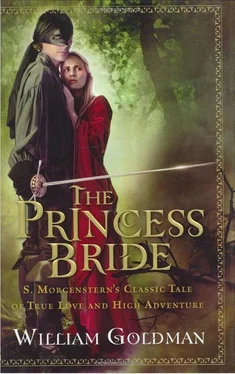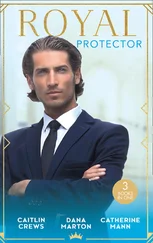By then he knew what had happened: ten years learning was ten years too long; too much had been allowed to happen. The six-fingered man was probably crusading in Asia. Or getting rich in America. Or a hermit in the East Indies. Or ... or...
Dead?
Inigo, at the age of twenty-seven, began having a few extra glasses of wine at night, to help him get to sleep. At twenty-eight, he was having a few extra glasses to help him digest his lunch. At twenty-nine, the wine was essential to wake him in the morning. His world was collapsing around him. Not only was he living in daily failure, something almost as dreadful was beginning to happen:
Fencing was beginning to bore him.
He was simply too good. He would make his living during his travels by finding the local champion wherever he happened to be, and they would duel, and Inigo would disarm him and accept whatever they happened to bet. And with his winnings he would pay for his food and his lodging and his wine.
But the local champions were nothing. Even in the big cities, the local experts were nothing. Even in the capital cities, the local masters were nothing. There was no competition, nothing to help him keep an edge. His life began to seem pointless, his quest pointless, everything, everything, without reason.
At thirty he gave up the ghost. He stopped his search, forgot to eat, slept only on occasion. He had his wine for company and that was enough.
He was a shell. The greatest fencing machine since the Cor-sican Wizard was barely even practicing the sword.
He was in that condition when the Sicilian found him.
At first the little hunchback only supplied him with stronger wine. But then, through a combination of praise and nudging, the Sicilian began to get him off the bottle. Because the Sicilian had a dream: with his guile plus the Turk's strength plus the Spaniard's sword, they might become the most effective criminal organization in the civilized world.
Which is precisely what they became.
In dark places, their names whipped sharper than fear; everyone had needs that were hard to fulfill. The Sicilian Crowd (two was company, three a crowd, even then) became more and more famous and more and more rich. Nothing was beyond or beneath them. Inigo's blade was flashing again, more than ever like lightning. The Turk's strength grew more prodigious with the months.
But the hunchback was the leader. There was never doubt. Without him, Inigo knew where he would be: on his back begging wine in some alley entrance. The Sicilian's word was not just law, it was gospel.
So when he said, "Kill the man in black," all other possibilities ceased to exist. The man in black had to die....
INIGO PACED THE cliff edge, fingers snapping. Fifty feet below him now, the man in black still climbed. Inigo's impatience was beginning to bubble beyond control. He stared down at the slow progress. Find a crevice, jam in the hand, find another crevice, jam in the other hand; forty-eight feet to go. Inigo slapped his sword handle, and his finger snapping began to go faster. He examined the hooded climber, half hoping he would be six-fingered, but no; this one had the proper accompaniment of digits.
Forty-seven feet to go now.
Now forty-six.
"Hello there," Inigo hollered when he could wait no more.
The man in black glanced up and grunted.
"I've been watching you."
The man in black nodded.
"Slow going," Inigo said.
"Look, I don't mean to be rude," the man in black said finally, "but I'm rather busy just now, so try not to distract me."
"I'm sorry," Inigo said.
The man in black grunted again.
"I don't suppose you could speed things up," Inigo said.
"If you want to speed things up so much," the man in black said, clearly quite angry now, "you could lower a rope or a tree branch or find some other helpful thing to do."
"I could do that," Inigo agreed. "But I don't think you would accept my help, since I'm only waiting up here so that I can kill you."
"That does put a damper on our relationship," the man in black said then. "I'm afraid you'll just have to wait."
Forty-three feet left.
Forty-one.
"I could give you my word as a Spaniard," Inigo said.
"No good," the man in black replied. "I've known too many Spaniards."
"I'm going crazy up here," Inigo said.
"Anytime you want to change places, I'd be too happy to accept."
Thirty-nine feet.
And resting.
The man in black just hung in space, feet dangling, the entire weight of his body supported by the strength of his hand jammed into the crevice.
"Come along now," Inigo pleaded.
"It's been a bit of a climb," the man in black explained, "and I'm weary. I'll be fine in a quarter-hour or so."
Another quarter-hour! Inconceivable. "Look, we've got a piece of extra rope up here we didn't need when we made our original climb, I'll just drop it down to you and you grab hold and I'll pull and—"
"No good," the man in black repeated. "You might pull, but then again, you also just might let go, which, since you're in a hurry to kill me, would certainly do the job quickly."
"But you wouldn't have ever known I was going to kill you if I hadn't been the one to tell you. Doesn't that let you know I can be trusted?"
"Frankly, and I hope you won't be insulted, no."
"There's no way you'll trust me?"
"Nothing comes to mind."
Suddenly Inigo raised his right hand high—"I swear on the soul of Domingo Montoya you will reach the top alive!"
The man in black was silent for a long time. Then he looked up. "I do not know this Domingo of yours, but something in your tone says I must believe you. Throw me the rope."
Inigo quickly tied it around a rock, dropped it over. The man in black grabbed hold, hung suspended alone in space. Inigo pulled. In a moment, the man in black was beside him.
"Thank you," the man in black said, and he sank down on the rock.
Inigo sat alongside him. "We'll wait until you're ready," he said.
The man in black breathed deeply. "Again, thank you."
"Why have you followed us?"
"You carry baggage of much value."
"We have no intention of selling," Inigo said.
"That is your business."
"And yours?"
The man in black made no reply.
Inigo stood and walked away, surveying the terrain over which they would battle. It was a splendid plateau, really, filled with trees for dodging around and roots for tripping over and small rocks for losing your balance on and boulders for leaping off if you could climb on them fast enough, and bathing everything, the entire spot, moonlight. One could not ask for a more suitable testing ground for a duel, Inigo decided. It had everything, including the marvelous Cliffs at one end, beyond which was the wonderful thousand-foot drop, always something to bear in mind when one was planning tactics. It was perfect. The place was perfect.
Provided the man in black could fence.
Really fence.
Inigo did then what he always did before a duel: he took the great sword from its scabbard and touched the side of the blade to his face two times, once along one scar, once along the other.
Then he examined the man in black. A fine sailor, yes; a mighty climber, no question; courageous, without a doubt.
But could he fence?
Really fence?
Please, Inigo thought. It has been so long since I have been tested, let this man test me. Let him be a glorious swordsman. Let him be both quick and fast, smart and strong. Give him a matchless mind for tactics, a background the equal of mine. Please, please, it's been so long: let—him—be—a— master!
"I have my breath back now," the man in black said from the rock. "Thank you for allowing me my rest."
"We'd best get on with it then," Inigo replied.
Читать дальше












